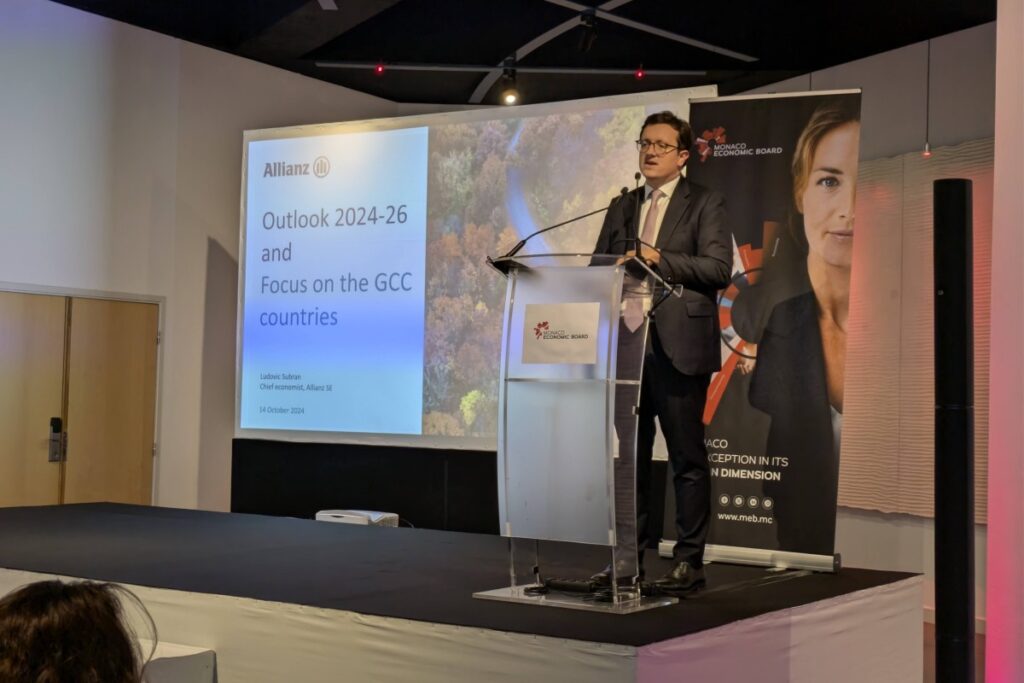One-man show or economics lecture? The global economy and GCCs dissected by Ludovic Subran

If you thought conferences on the economy were boring, it’s probably because you’ve never been to one by Ludovic Subran. The chief economist of the Allianz Group, who has also worked for the World Bank, was back in Monaco at the invitation of the Monaco Economic Board (MEB), two years after his last visit to the Principality.
In a lively and fascinating talk, with a few well-aimed jibes thrown in, Ludovic Subran gave an overview of the current global economy and what lies ahead, before going on to illustrate it through the subject he had been invited to speak on: “The Gulf States, from oil to knowledge.”
A world on tenterhooks
If there is one takeaway from his assessment of the global economy, it is that today’s world is in a state of suspense, waiting for the US elections with bated breath. “No one moves until everyone moves,” the economist said. Oil prices aren’t even reacting to the war going on in the Middle East.
Ludovic Subran summarises: “If it’s Harris, it’s boring. Things will continue in the same vein. If it’s Trump, there will be an increase in customs barriers, a trade war with China, the deportation of 7 million Latinos, which will be a huge loss to the US economy” and ultimately “inflation.” In other words, if it’s Trump in the very short term “it’s party time,” but medium term “there will be trouble on the horizon.” He advised caution for businesses working with companies that are in debt should Trump win the US election.

In the rest of the world, major economies such as Japan and Germany are in recession. China is suffering chronic deflation. Italy, on the other hand, “has returned to a primary surplus” thanks to strong exports. It is the world’s 4th largest exporter. “Exports work. You really have to believe in it,” urges the economist, ruing the slow collapse of the sector in France. Speaking of France, his assessment isn’t very optimistic. He predicts: “Austerity’s on the way, folks!” because of “the amateurs at the helm.”
Europe is suffering from a lack of competitiveness due to higher gas and energy prices than the rest of the world. “In Europe, we don’t have faith our own continent and we don’t invest. We prefer to protect margins for the shareholders, because there is no vision for the future.” In the United States and now in the Gulf States, the opposite is true. They invest in every sector and observe what works.
Gulf countries, a “stunning” strategy
Michel Dotta, President of the MEB, announced to the audience at the outset: “There is significant growth potential for you, and we need to focus on it.”
Although the Gulf States (Gulf Cooperation Council or GCC countries) have been able to take advantage of their natural resources to diversify their economies, the transition is not yet complete, and they are still heavily dependent on oil revenues. To move away from them, they have put three tools in place: exports, overseas property investment and their sovereign wealth funds. The strategy consists of “accumulating oil revenues by spreading investments over time” in order to acquire cutting-edge technologies, and looking to the future with “stunning” long-term strategic visions. “They have time on their side.”
With a currency that is closely, probably too closely, tied to the dollar, the economist warns: “This is not tenable in the medium term.” He suggests that these countries will need to adjust their economies to prevent a capital drain because of rising interest rates, creating a common currency for example.
With this backdrop, demographics are a pivotal question. Dubai, for example, needs 500,000 people every year to maintain its tax revenues. The economist pointed out the low productivity of these countries and their reliance on artificial intelligence, particularly in public services, to counter it.
The GCC countries’ stability despite successive crises has benefited local business, and they have attracted many people.









